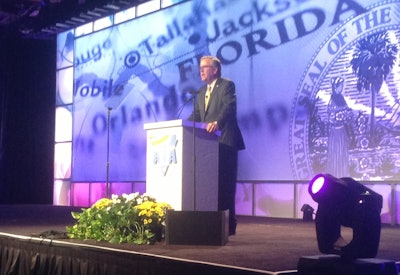 Former Florida Gov. Jeb Bush talked U.S. tax policy, energy policy, education policy and economic growth at the American Trucking ASsociations Management Conference & Exhibition in Orlando, Fla., Monday, Oct. 21.
Former Florida Gov. Jeb Bush talked U.S. tax policy, energy policy, education policy and economic growth at the American Trucking ASsociations Management Conference & Exhibition in Orlando, Fla., Monday, Oct. 21.If the U.S. economy were to grow at 3.5 percent per year it would create $4 trillion by the 10th year — the equivalent of the economy of Germany — and create more opportunity than government ever has and more revenue than any tax increase. Such growth, former two-term Florida Gov. Jeb Bush told attendees at the annual American Trucking Associations Management Conference & Exhibition in Orlando, Fla., would be the answer to many of our countries woes.
“You seldom hear anyone talk about how the U.S. could regain its footing through growth,” he said. “It’s all about economic fairness, support for people in poverty, but not about how to lift them out. We’d be a lot more optimistic if we were growing.”
Achieving such growth would require significant changes in policy, Bush said, noting that we’d have to deal with issues such as the cost of health care. “Obamacare isn’t going to bend the cost curve down — probably the other way around,” he said. He also called for personal and corporate tax reform. “If we simplified the code it would create an unleashing of entrepreneurialism,” he said.
Bush’s three-pronged approach to spurring growth starts with what he calls “a patriotic energy policy” that would exploit our own resources. “We have 100 years of gas reserves, yet last year $300 billion left our country without any economic benefit to us and went to countries, some of whom hate us,” he said. “The great news is the U.S. is the largest producer of oil and gas in the world today and it could grow exponentially if we created a strategy around it,” he said.
He called the combination of hydraulic fracking and horizontal drilling technology the “greatest innovation in America in the last generation,” and said that while states such as North Dakota and Texas are creating economic opportunities around natural gas, states like California and New York are missing out. He called for approving the Keystone XL Pipeline, creating incentives for energy conservation and letting market forces decide where to invest. “Government sponsored venture capital is an oxymoron,” he said.
Immigration reform is the second change needed to grow our economy, Bush said, calling it “the greatest weapon we have to create sustained economic growth.” The demographic pyramid on which our current contract with the elderly is based has been turned upside down, he said. Unless we substantially increase our birth rate, immigration is the only source of finding young, talented aspirational people to rebuild our demographic pyramid. He called for dramatically expanding the number of people who come in with certain skills that can help grow the economy. “For those who have come here illegally there must be a way for them to pay a fine and have a path to citizenship,” he said.
And finally, Bush called for a radical change in our education system. Despite spending more than any country except Luxembourg, only one-third of our high school graduates are college or career ready, he said. “It’s impossible to imagine how we create a society of high growth unless we radically change how we educate.” The neighborhood school has turned into a job-creating system for government and unions, he said, when what we need is innovation, higher standards and robust accountability.
Achieving the kind of growth that’s possible with these initiatives requires leadership, Bush said. He encouraged the audience to “use whatever influence you have to challenge every elected official that the broader good has to outweigh special interests,” he said.











